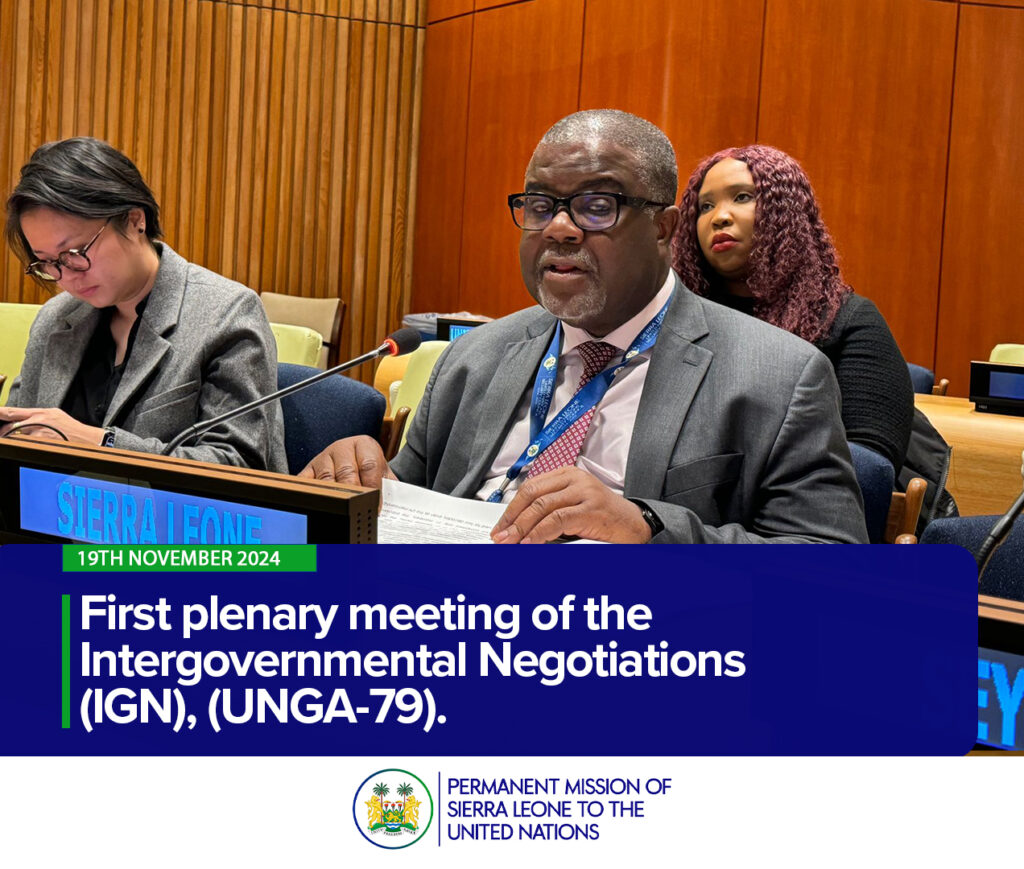Distinguished Co-Chairs,
Excellencies,
Distinguished delegates,
I am honoured to deliver this statement on behalf of the African Group.
I thank you, Co-Chairs, for convening this first plenary meeting of the Intergovernmental Negotiations (IGN) this session (UNGA-79).
Since this is also the first plenary meeting following your re-appointment by the President of the General Assembly, allow me to extend our heartfelt congratulations to you, Co-Chairs, on your reappointment. I want to reassure you of Africa’s continued support for your leadership, which has been pivotal in advancing the reform process. We are pleased to lend our full support as you continue to navigate the critical IGN process, and we work together to achieve meaningful progress this session.
We take note of your letter dated 30 October 2024, which provides the timeline of meetings, guidance on the IGN discussions, and assistance to Member States in future planning for the subsequent sessions. We also thank you for convening the first informal discussion “Back to Work” session on 22 October 2024.
Distinguished Co-Chairs,
In our effort to breathe new life into the IGN discussions, we must concentrate on what can be accomplished in practical terms this session, particularly in light of the differences in positions, perspectives and views among Member States and interest groups regarding reform models, as well as varied approaches to procedural issues and garnering the necessary political will.
It is undeniable that the proportional representation of Member States in the Security Council has diminished significantly as the overall membership of the United Nations has grown since the last reform in 1965. In 1945, when the UN was founded, Africa was largely unrepresented. Out of 51 Member States, the Security Council comprised only 11 members. This imbalance continued for two decades, even as the UN membership expanded. It wasn’t until 1965, following an amendment to Article 23 of the UN Charter, that the Security Council was extended to 15 members, even though the total membership had already surpassed 100 nations. This proportional imbalance remains despite the staggering growth of the UN to 193 Member States in 2011. This situation urgently calls for reform to ensure fair and equitable representation for all member nations in this vital body.
Africa’s position is, therefore, that the composition of the Security Council should be democratized to reflect the diversity of the Member States of the United Nations. Africa firmly advocates for a comprehensive reform of the Security Council to secure its rightful and fair representation within an expanded framework. Specifically, regarding the cluster of categories of membership, Africa accordingly proposes an expansion in membership in both categories to a total of no less than 26, with Africa allocated no less than two Permanent seats in the Permanent category with all its privileges and prerogatives, including the right of the veto to redress the continent’s non-representation and, a total of five seats in the Non-Permanent category to address the under-representation in that category. This will correct the existing levels of imbalance, redress the historical injustice, and give more representative legitimacy to the Security Council.
This call for reform is not just a matter of fairness; it serves to rectify the current structural imbalance in the Council’s representation. In this regard, Africa continues to reject proposals for longer-term or intermediate seats, as these do not adequately address the vital concerns and aspirations outlined in the Common African Position as espoused in the Ezulwini Consensus and Sirte Declaration.
Distinguished Co-Chairs,
Regarding cross-regional representation, it is crucial to first reiterate our position and perspective on regional representation. Africa is one of the largest regions by size, population, and UN membership. Also, the African Union plays an increasingly significant role in fostering international peace and security, and its concerns have become central to the Council’s agenda. Therefore, we firmly advocate for a reform process acknowledging Africa’s right to fair and equitable geographical representation in the Security Council, taking into account the principles, objectives and ideals of the United Nations Charter for a fairer world based on universalism, equity and regional balance within the United Nations system. This advocacy for regional representation closely aligns with our call for expansion within both the Permanent and Non-permanent categories of the Security Council, as well as the imperative to reconsider the veto power if it remains in effect.
Furthermore, Africa notes the views being expressed on the IGN discussing the issue of cross-regional representation. As we continue to emphasize the imperative for equitable geographical representation, necessary for all geographic regions to be fairly represented in an expanded Security Council, the notion of cross-regional representation, in appropriate circumstances, may lend support to the objectivity of ensuring a representative Security Council. We therefore look forward to hearing the views of Member States and Interest Groups on this issue.
Distinguished Co-Chairs,
Africa appreciates the general consensus among the membership for correcting the historical injustice against Africa and the need to treat Africa as a special case and priority in the IGN process, now clearly outlined in the “Pact for the Future” and restatements of the Co-Chairs’ Revised Elements Paper. We stand resolute in our dedication to the urgent and comprehensive reform of the UN Security Council. This reform is vital for preserving the core principles, objectives, and ideals articulated in the UN Charter and fostering a more just and equitable world grounded in universal values, fairness, and regional balance.
In closing, Distinguished Co-Chairs, permit me to reiterate our profound gratitude to Member States and Interest groups for their continual support for the Common African Position. The African Group looks forward to an increase in pace for more frank discussions, with all Member States in an open, transparent, inclusive membership-driven process to achieve progress that will lead to the ultimate realisation of making the Security Council more broadly representative, democratic, effective, and transparent to enhance the legitimacy of its decisions. We therefore encourage all Member States and Interest groups to participate constructively, transparently, fully, and actively during this session.
I thank you.



